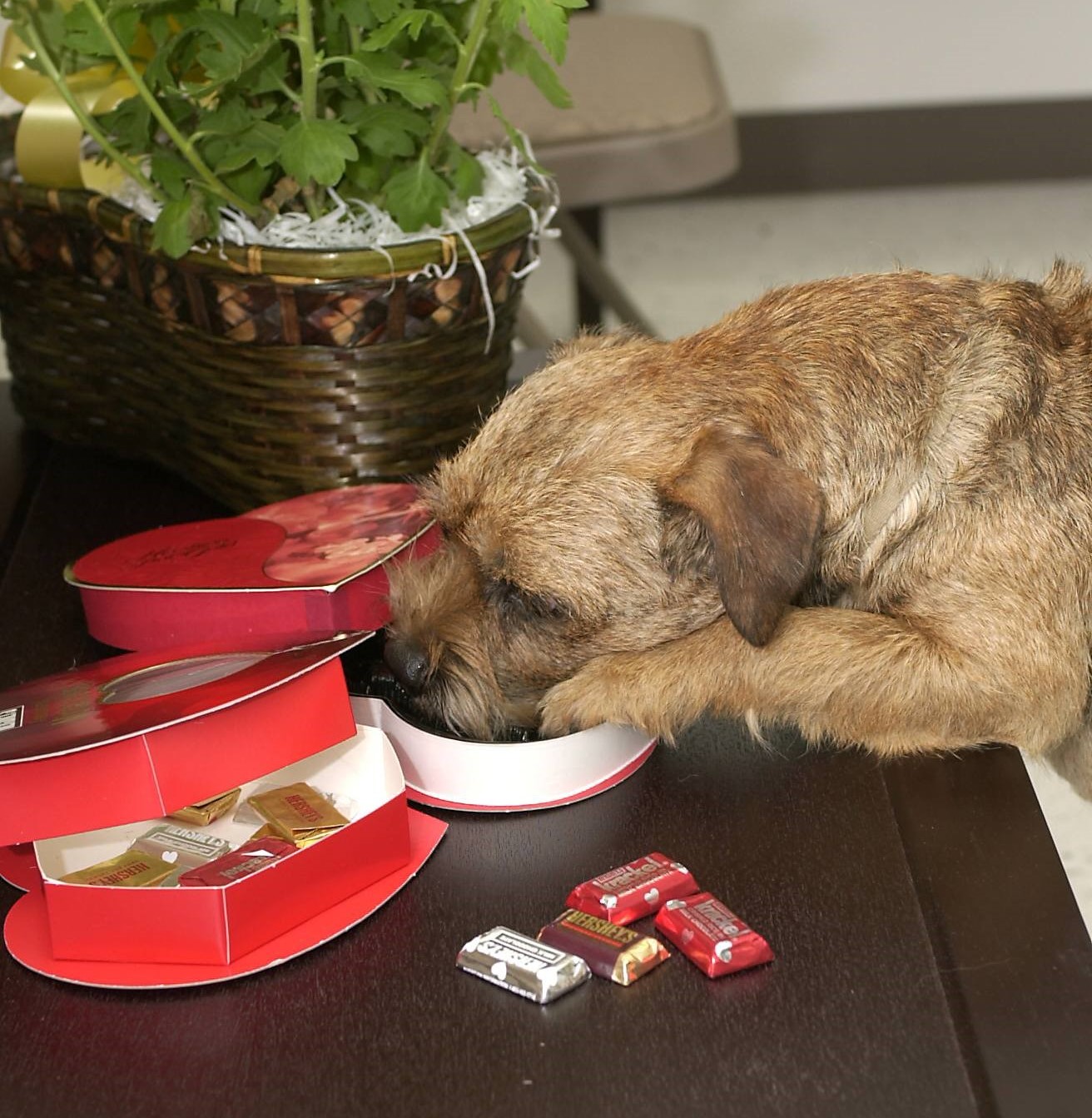 Listen to this story.
Listen to this story.
Radster_in_the_chocolate

Photo by Dr. Sharon Gwaltney-Brant
A terrier named Raster was enlisted to pose for a presentation on things poisonous to pets. If he'd really gotten into a box of chocolates, his owner's first call might have been to a national pet poison control hotline. A new telemedicine law in Georgia has shut down that option in the state, at least for now.
The nation's only 24-hour animal poison control hotlines stopped providing guidance to callers from Georgia this month following the passage of a law on remote care that they believe prohibits them from dispensing treatment advice to nonveterinarians in the state.
The law, which went into effect July 1, amended the state's veterinary practice act to formally recognize and regulate three types of remote veterinary services: veterinary teleadvice, veterinary teletriage and veterinary telemedicine. Poison control centers generally are understood to be a form of teletriage, as they typically advise pet owners on whether and with what urgency to take an animal to a hospital.
Leaders at the ASPCA Animal Poison Control Center and the Pet Poison Helpline say provisions in the law, including a requirement that veterinarians providing teletriage be licensed in the state, make it illegal for all or most of their practitioners to advise Georgia pet owners.
The Georgia Veterinary Medical Association (GVMA), which helped draft the language of the legislation and advocated for its passage, however, maintains that the national poison control hotlines remain legal. "This bill was not intended to impede poison control centers," Dr. Keri Riddick, GVMA's executive director, told the VIN News Service.
Dr. Tina Wismer, senior director of toxicology for the ASPCA's hotline, said that's how she understood the bill when it was first proposed. Checking with the GVMA at the time, the ASPCA was told, "Don't worry about this. This should not affect the ability of poison control to work in the state of Georgia," she said.
The not-for-profit ASPCA hotline responded to about 10 calls a day from pet owners in Georgia before the change, according to Wismer. Dr. Ahna Brutlag, vice president of veterinary services and senior toxicologist for the for-profit Helpline, said her service responded to approximately 35,000 calls from Georgia over the past five years (an average of about 19 calls per day). The hotlines charge pet owners a flat fee for advice.
Now, both centers refer Georgia callers to their own veterinarians. They continue to provide consultations to veterinary professionals in the state.
Riddick at the GVMA contends that poison control services are not affected by the new restrictions on teletriage. She pointed to language in the law that says it "shall not be construed to prohibit … any person whose expertise, in the opinion of the licensed veterinarian, would benefit the animal."
Wismer and Brutlag say they are not persuaded that their practitioners are exempt from the new provisions.
If they remain wary, Riddick said, she'd like to see the Georgia State Board of Veterinary Medicine clarify the law to enable the organizations to feel comfortable advising Georgia pet owners again.
"We want to be good partners to poison control," Riddick said. "There's lots of room within the rules to help them operate the way they need to."
The board may take up the issue at its Aug. 20 meeting. The communications office for the board did not respond to an email from VIN News.
Remote veterinary care rules in flux across country
The new law in Georgia comes as state legislators around the country have been both expanding and restricting — depending on the state — the rules on veterinary telemedicine.
They are responding to efforts by various groups, including animal welfare organizations and telemedicine corporations, to roll back the requirement for an in-person examination to establish a veterinarian-client-patient relationship (VCPR), which is a foundation for treatment.
The rationale for an in-person initial visit is that, unlike people, nonhuman animals cannot tell doctors how they feel, so a hands-on exam is necessary. Proponents of expanding telemedicine see the requirement for an in-person visit as a hindrance to accessing care. They also point to the example of human medicine that allows for some telehealth for infants and toddlers, who also can't describe how they feel.
In recent years, states including Arizona, California, Florida and Ohio have rolled back the requirement to see the patient in person first. Other states, such as Louisiana, North Dakota and South Carolina, have doubled down on requiring an initial physical exam.
Under Georgia's new law, providing teletriage does not require a VCPR at all. However, the law states that teletriage providers licensed in the state may offer guidance under three conditions:
- That no licensed veterinarian or veterinary technician is available within a 50-mile radius.
- With the understanding that the client will present the animal patient for a physical examination at a veterinary facility as soon as reasonably practical.
- That they inform the client, in writing, of their full name, location, license number, licensure status and limitations involved in accessing veterinary teletriage, and obtain a signed and dated statement from the client indicating receipt of such required information.
Brutlag at the Pet Poison Helpline said the provisions could hamper quick treatment of the patient.
"Inevitably, time is of the essence," she said. For example, if a dog swallows its owner's Advil (ibuprofen), which can be lethal to canines, "there is a 20- to 30-minute window in order to prevent poisoning. Action needs to be taken in that decontamination window," Brutlag said, referring to inducing vomiting in the dog. (Inducing vomiting should not be attempted by a layperson without the advice of a veterinarian.)
Brutlag argued that there is no time — or even a process — for getting informed consent as laid out in the law or determining whether the pet owner is within 50 miles of a practice.
Riddick at the GVMA interprets the 50-mile-radius condition differently. She maintains that the provision "is permitting veterinarians to practice teletriage in any area where there is not a veterinarian."
Another provision that the poison control veterinarians said impedes their operation in Georgia is the requirement of teletriage practitioners to be licensed in the state. Brutlag said none of the Helpline's 40 veterinarians have a Georgia license. Wismer said one of the ASPCA's approximately 55 veterinarians has a Georgia license. She wondered if only that veterinarian could field calls from the state. If the person is off work and asleep, would they need to be roused?
Riddick said the GVMA met with Wismer and others at the ASPCA yesterday. The answer to that question, she said, is that others on staff may take the calls under the indirect supervision of a licensed Georgia veterinarian.
In general, she said, she believes it would be "beneficial" for each operation to have a Georgia-licensed veterinarian on its team to enable the state veterinary board "to have oversight of health care tasks performed within Georgia to protect the public."
Brutlag at the Helpline said she, too, has talked with the association. "The bottom line is that the GVMA may have contributed to writing the law, but they do not enforce the law," she wrote in an email to VIN News. "That's the job of the Board. So, ultimately, we need clarification from the Board on this."
She noted that in addition to pet owners and their animals losing hotline access, the situation "puts a lot of challenges back on the veterinarian in Georgia," referring to the practitioners who must now triage pet owners' poison concerns themselves.
The flap in Georgia probably will not be a one-off, as regulators attempt to get a handle on veterinary telemedicine. "There are definitely other states that have changed language or have these kinds of bills coming down the pipeline," Wismer said.